
Cost
How Much Does a Bathroom Addition Cost?
09.26.2025
Our New Year savings event is here: Get up to $6,500 off your project today (terms apply).

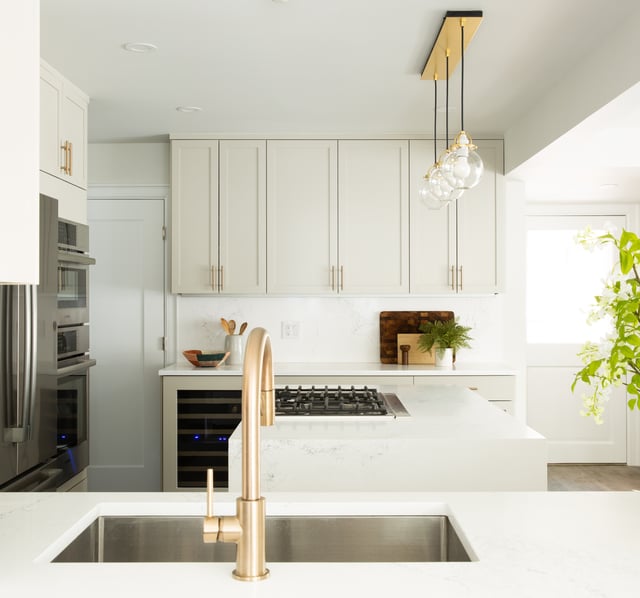
In This Article
Dreaming of renovating your home in the DMV? Whether you’re updating a classic Georgetown townhouse or breathing new life into a suburban home, the journey can be as thrilling as it is challenging. Home renovations in the DC Metro Area come with their unique blend of costs, surprises, and rewards. You might find yourself choosing between sleek countertops or stylish bathroom finishes while navigating the occasional unexpected hiccup that older homes are known for. This guide will help you map out expenses, find the right contractors, and keep your project on track. Let’s break down what it really costs to renovate your home in Washington, D.C. area.
Design a Home That’s Uniquely Yours
Block can help you achieve your renovation goals and bring your dream remodel to life with price assurance and expert support.
Get Started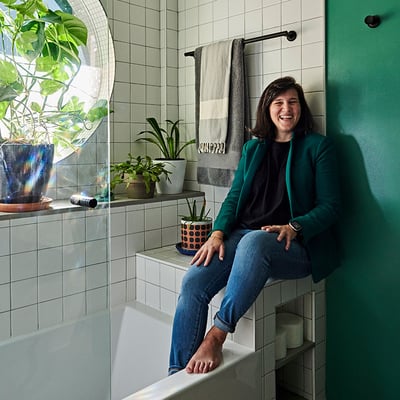
When it comes to renovating a home in the Washington, D.C. Metro Area, costs can vary quite a bit depending on the project’s scope and the finishes you choose. For a basic renovation—think painting, new flooring, and other cosmetic updates—you’re looking at anywhere from $100 to $300 per square foot. But if your project involves structural changes or high-end materials, those numbers can jump to $400–$800 per square foot or more.
Specific remodels like kitchens and bathrooms come with their own price tags. A kitchen renovation, for example, typically costs between $24,000 and $42,000, while redoing a bathroom can range from $28,000 to $50,000. Keep in mind these are just averages—costs can swing higher if unexpected issues arise, like plumbing or electrical upgrades. To ensure you’re getting the best value, it’s smart to gather multiple quotes from contractors. Block helps you compare different quotes so you can choose the contractor that best fits your needs and budget.
Renovation costs around D.C. can swing wildly depending on the size of your project and the choices you make. Whether you're just freshening up a room or going for a total overhaul, here's a breakdown of what can drive up—or keep in check—your home renovation budget.

Labor is usually the biggest line item, eating up around 60% of your budget. The more complex your project, the higher the labor costs. If you're dreaming of knocking down walls or installing that spa-worthy soaking tub, you’ll need a crew of pros—think general contractors, electricians, and plumbers. And as your renovation ambitions grow, so do those labor fees!
Bringing in a designer might seem like an extra splurge, but it can actually save you money in the long run by preventing costly mistakes. Designers can help with everything from choosing materials to creating the perfect layout, making your dream space a reality. And if you just need a little help—like picking the perfect paint color—there are flexible options to fit your needs without breaking the bank.
Expect materials to take up around 30% of your budget. Flooring, cabinets, tiles, appliances—everything adds up fast. Whether you're choosing high-end finishes or going for something more budget-friendly, it's amazing how quickly those material costs can sneak up on you. So, plan ahead and choose wisely to keep your budget in check.
Lastly, be sure to set aside at least 10% of your budget for unforeseen expenses. These can include electrical updates or repairs for mold and rot.
Transparent Pricing You Can Trust

Cost for gut renovation vs. non-gut renovation in the DMV
Thinking about a gut renovation in the DC Metro Area? Brace yourself for a complete transformation—everything from walls and floors to plumbing and electrical systems could be in play. This type of renovation allows you to reimagine your entire space, but it doesn't come cheap. In the D.C. area, gut renovations can cost anywhere between $400 to $800 per square foot, depending on the level of finishes you choose. For a 1,000-square-foot home, you’re looking at a price tag of around $400,000 to $800,000. Tackling a larger space, like a 2,500-square-foot home? Expect costs to fall between $1 million and $2 million.
If a full gut renovation sounds a bit overwhelming, a non-gut renovation might be more up your alley. This option focuses on cosmetic updates—new paint, flooring, or fixtures—without making any major structural changes. These types of renovations typically start at $100 to $300 per square foot, making them a more affordable way to refresh your home while keeping the bones intact.
No matter which route you choose, the final costs will depend on your project’s details. And don't forget to pad your budget for the unexpected surprises that always seem to crop up during renovations.
When planning a renovation in the DMV, don’t forget about the cost of permits—it’s an essential part of the process. You’ll probably need a basic permit for smaller projects, like cosmetic updates that don't involve any major changes. It's straightforward and covers things like painting or replacing fixtures. But if your renovation is more ambitious—building an addition, knocking down walls, or changing the layout—you’ll need a more extensive permit, which can set you back anywhere from a few hundred to a few thousand dollars.
You might also need to submit construction drawings, which adds another layer to the process. It can feel like a bit of red tape, but these permits are key to making sure your renovation stays on track and meets building codes. Be sure to coordinate with your contractor to ensure you’re obtaining the correct permits for your town in Maryland, Virginia, or DC.
When planning a renovation around D.C., one big factor to consider is whether you’re working on a “dry” or “wet” space. This isn’t just a small detail—it can significantly impact your overall renovation costs. Here's what to keep in mind:
Renovating wet spaces like bathrooms, kitchens, and laundry rooms tends to come with a higher price tag. These areas deal with constant exposure to water and humidity, so you'll need specialized labor and materials. Think plumbing, tiling, waterproofing, and durable, water-resistant finishes. Hiring experienced pros is key here because mistakes can lead to pricey repairs later on.
In contrast, dry spaces such as bedrooms, living rooms, and dining rooms are generally easier on the budget. Since there’s no plumbing or waterproofing involved, the work tends to be more straightforward—things like painting, new flooring, or electrical updates. Renovating these areas is usually more cost-effective than tackling a wet space.
When planning a renovation in the DC Metro Area, it’s important to think about your heating and cooling options. The costs can vary depending on the system you choose and your home’s setup. Here’s what you need to know:
Installing a new HVAC system can be a major expense. A basic setup might start around $2,000, but more advanced systems can easily run into the tens of thousands. The total cost will depend on factors like the type of system you go for and the size of your home.
In larger homes around D.C., central systems are often the go-to. While they’re more expensive because of the ductwork and high-capacity units required, they offer the benefit of keeping the entire house at a consistent temperature, which can be a big plus during those humid summers and cold winters.
If you’re looking for something more flexible and energy-efficient, split systems or mini-splits could be a great option. They’re ideal for heating or cooling individual rooms and are much easier to install, especially in older D.C. homes without existing ductwork. They also tend to be more affordable upfront and can save you money on energy bills over time.
For those who want a bit of luxury, radiant heating is worth considering. This system installs heating elements under your floors or in the walls, providing cozy warmth, especially during D.C.’s chilly winters. While installation costs are higher, there’s nothing quite like stepping onto a warm floor on a cold morning. If you’re willing to splurge, this could be a fantastic upgrade.
Don’t forget to factor in the long-term operating costs, too. While more energy-efficient systems might have a higher upfront cost, they can lead to significant savings on your utility bills in the long run. It’s an investment that can pay off over time, especially with D.C.’s varied climate.
Compare Proposals with Ease
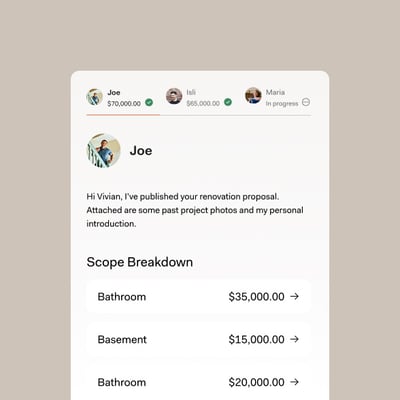
Creating a clear and realistic budget is essential for keeping your renovation on track and avoiding unexpected costs. A well-thought-out budget helps you focus on what matters most and determine where to save. Here’s how to get started:
Set realistic expectations
Before jumping into your renovation, closely examine your finances and establish a practical spending limit. It’s easy to get carried away with big ideas, but knowing your financial limits upfront will help keep your project within reach and on track.
Think about what’s most important for your renovation. What areas of your D.C. home need the most attention? By identifying your top priorities, you can ensure your budget goes to the essential improvements and avoid overspending on less important upgrades.
To keep things organized, break your budget into key categories such as labor, materials, design services, permits, and a contingency fund. A general rule of thumb is to allocate around 60% of your budget to labor, 30% to materials, and set aside 10% for any unexpected costs.
Focus on the must-haves first. Safety and functionality should always come before aesthetics. Upgrading electrical systems and plumbing or handling structural repairs should be at the top of your list before moving on to cosmetic changes.
No matter how well you plan, surprises can—and will—happen. Set aside 10-20% of your budget for unplanned expenses. This will ensure you’re prepared for anything unexpected without throwing off your overall financial plan.
Learn more: How to Start Planning a Home Renovation
Turn your renovation vision into reality
Get matched with trusted contractors and start your renovation today!
Find a Contractor
Choosing the right contractor is one of the most critical decisions you'll make for your renovation. The right professional will guide you through every phase of the project and help manage any obstacles that come up along the way.
While finding the perfect contractor might seem daunting, Block can simplify the process by connecting you with up to three top quality contractors from our vetted network. Each contractor goes through a thorough vetting process to ensure they:
You'll be able to meet these contractors during a site visit, easily compare their proposals, and choose the one that best suits your renovation goals.

Written by Block Renovation
What is the average cost per square foot for a home renovation in the DC Metro Area?
How long does a typical home renovation take in the DC Metro Area?
Do I need a permit for my home renovation in the DC Metro Area?
Can I live in my home during the renovation?
What are some hidden costs I should be aware of?
How much does it cost to renovate a bathroom in the DC Metro Area?
What is the process for getting a renovation permit in the DC Metro Area?
What is the cost of hiring an architect or designer for a renovation project in the DC Metro Area?
How can I ensure my renovation project stays on budget and on schedule?

Renovate confidently with Block
Easily compare quotes from top quality contractors, and get peace of mind with warranty & price protections.
Thousands of homeowners have renovated with Block

4.5 Stars (100+)

4.7 Stars (100+)

4.5 Stars (75+)

Cost
How Much Does a Bathroom Addition Cost?
09.26.2025
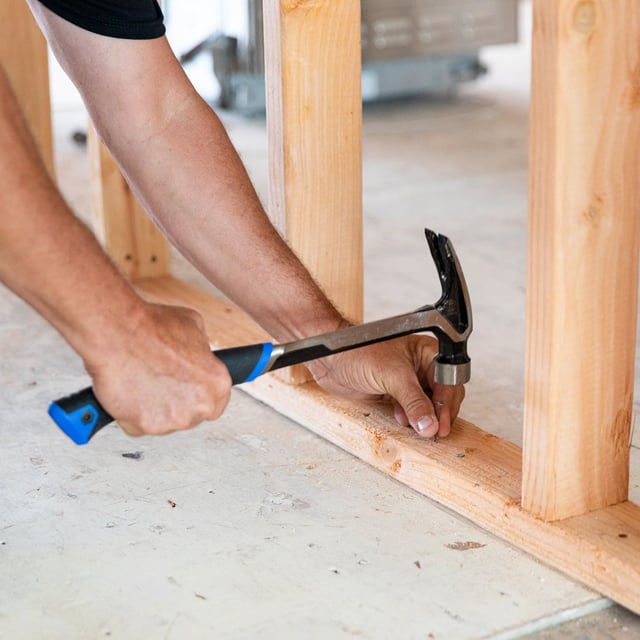
Cost
Calculating the Cost of Your 12x24 Addition
09.18.2025
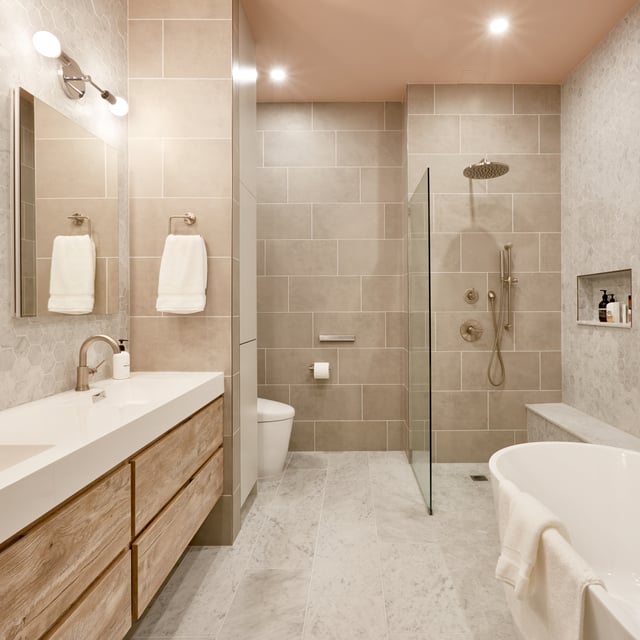
Cost
10x10 Bathroom Remodeling Costs
09.18.2025

Cost
The Average Cost of a Jacuzzi Bath Remodel—and How to Save
09.18.2025
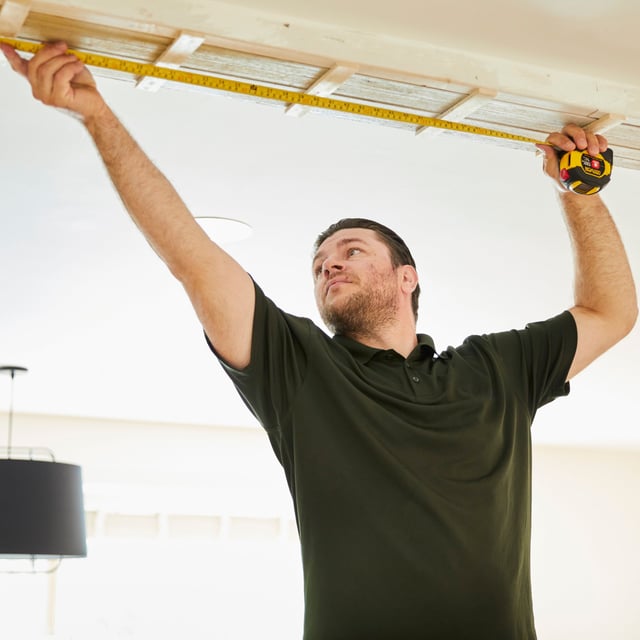
Cost
Ceiling Installation Costs: Repairs & Replacement Pricing
09.05.2025
Renovate confidently